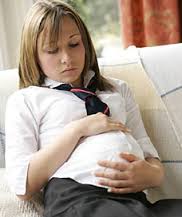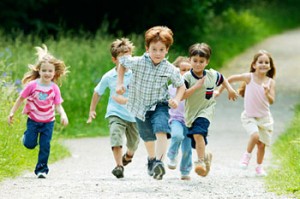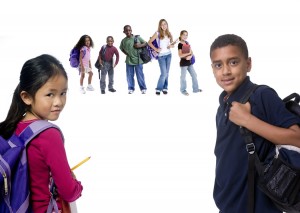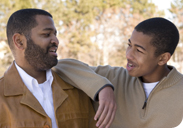 The evidence shows that high school dropouts earn less money, have poorer health outcomes and are more likely to get into legal trouble. And teenagers who are pregnant or who are parents are especially vulnerable to dropping out of school. There are hundreds of programs designed to keep teens in school. But how effective are they, especially for pregnant and parenting teens?
The evidence shows that high school dropouts earn less money, have poorer health outcomes and are more likely to get into legal trouble. And teenagers who are pregnant or who are parents are especially vulnerable to dropping out of school. There are hundreds of programs designed to keep teens in school. But how effective are they, especially for pregnant and parenting teens?
How to keep teen parents in school
The evidence on schools and risky behavior
The evidence on babies, sleep and crying
 I’ve still got babies on the brain as I refresh my memory on how to care for a newborn. By the time they were two months old, my two older children were learning to sleep in their cribs. That meant letting them cry and learn to settle themselves when I knew all of their needs were met. So I was curious to read some recent media reports about the evidence on “crying-it-out.”
I’ve still got babies on the brain as I refresh my memory on how to care for a newborn. By the time they were two months old, my two older children were learning to sleep in their cribs. That meant letting them cry and learn to settle themselves when I knew all of their needs were met. So I was curious to read some recent media reports about the evidence on “crying-it-out.”
How to identify emotional abuse and neglect in preschoolers
 The evidence is clear that developing skills early-on – especially before children enter kindergarten – is essential for success later in life. Unfortunately, children face consequences throughout their lives when they do not get the support they need as babies and preschoolers. Physical and behavioral problems and delays in social and communication skills are just some of the poor outcomes. [Read more…]
The evidence is clear that developing skills early-on – especially before children enter kindergarten – is essential for success later in life. Unfortunately, children face consequences throughout their lives when they do not get the support they need as babies and preschoolers. Physical and behavioral problems and delays in social and communication skills are just some of the poor outcomes. [Read more…]
The state of preschool
 Preschool is important to children’s development – the evidence on that is clear. But since preschool is not required and often not offered by local school systems, not all families have access to quality preschool programs. [Read more…]
Preschool is important to children’s development – the evidence on that is clear. But since preschool is not required and often not offered by local school systems, not all families have access to quality preschool programs. [Read more…]
Evidence on child well-being across the globe
 Ensuring children grow up to be healthy, productive and fulfilled adults are major goals of every society. Children across the world today face complex risks and challenges including the wide availability of unhealthy foods, the prevalence of bullying and increases in drug and alcohol abuse. [Read more…]
Ensuring children grow up to be healthy, productive and fulfilled adults are major goals of every society. Children across the world today face complex risks and challenges including the wide availability of unhealthy foods, the prevalence of bullying and increases in drug and alcohol abuse. [Read more…]
How gay marriage impacts the well-being of children
 As the U.S. Supreme Court is set to consider a historic case on gay marriage, new evidence is available on how same-sex unions impact children. [Read more…]
As the U.S. Supreme Court is set to consider a historic case on gay marriage, new evidence is available on how same-sex unions impact children. [Read more…]
Evaluating programs to promote teen sexual health
 Teenagers and young adults represent only 25 percent of the sexually active population in the U.S., but they acquire nearly half of all new sexually transmitted infections, according to the U.S. Centers for Disease Control. [Read more…]
Teenagers and young adults represent only 25 percent of the sexually active population in the U.S., but they acquire nearly half of all new sexually transmitted infections, according to the U.S. Centers for Disease Control. [Read more…]
The serious effects of physical discipline
There are many factors that influence how parents discipline their children: parents’ own upbringing, family customs and stress levels all factor in. But there is clear evidence that some forms of discipline – specifically physical punishment – have negative effects on children throughout their lives.
A new systematic review reveals a body of evidence demonstrating physical punishment may increase the chances of antisocial behavior and aggression, depression, anxiety, drug abuse and psychological problems later in life.
The review is especially interesting because it discusses intervention programs designed to reduce physical punishment and child abuse. It included a trial of one intervention that taught parents to reduce their use of physical punishment, which led to less difficult behavior by their children.
Another such program – called Triple P – originated in Australia was tested in a study funded by the U.S. Centers for Disease Control. The program uses a broad range of strategies to address physical abuse including consultations with parents, public seminars and public service announcements on local media. It led to significantly positive results that are encouraging if replicated in other areas of the U.S. Counties that implemented the program had lower rates of substantiated child abuse cases, fewer instances of children removed from their homes and reductions in hospitalizations and emergency room visits for child injuries.
John Eckenrode, professor of human development and director of Cornell’s Bronfenbrenner Center for Translational Research, is an expert in child abuse and maltreatment. He’s written a chapter about preventing child abuse in the book Violence against women and children, published by the American Psychological Association.
“We know that there are tested and effective ways to support parents so that they can better provide a safe and supportive environment for their children without resorting to physical punishment,” he said. “But we must get the word out, provide those who interact with parents such as teachers and physicians with the tools they need to promote positive parenting strategies, and provide resources to states and localities to scale-up effective programs.”
The take-home message: Physical punishment and child abuse are serious problems that have life-long effects. But there is a growing body of evidence that intervention programs can help guide parents to other methods of discipline.






